Ukraine crisis: Russia and sanctions
- Published
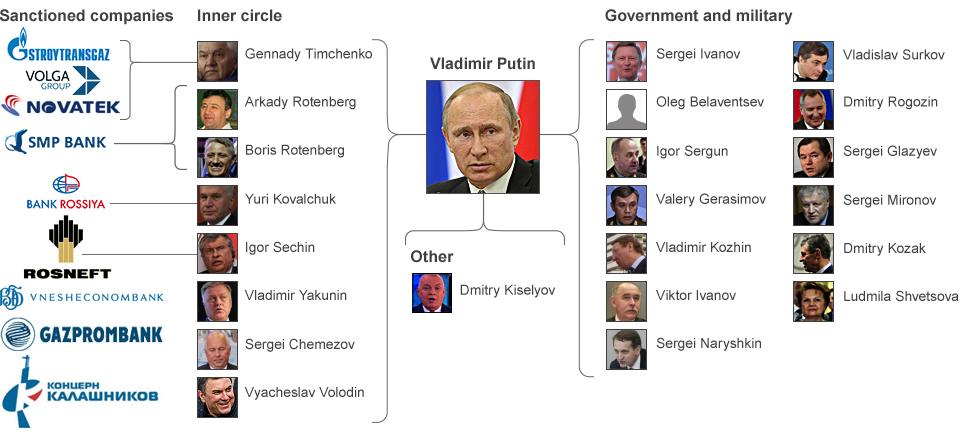
The US and EU have imposed an array of sanctions on Russian individuals and businesses in response to the annexation of Crimea and the crisis in eastern Ukraine.
The deaths of 298 people on board a Malaysia Airlines plane destroyed over eastern Ukraine on 17 July triggered tougher EU sanctions.
The US published lists of individuals and companies hit by travel bans and asset freezes on 19 March, external, 20 March, external, 28 April, external, 16 July, external and 12 September, external. The EU's lists were issued on 17 March, external, 23 March, external, 29 April, external, 12 May, external, 25 July, external, 30 July, external, 12 September, external and 18 December, external.
The EU and US have also targeted certain key sectors of the Russian economy which are closely connected to the ruling elite.
Russian state banks are now excluded from raising long-term loans, exports of dual-use equipment for military use in Russia are banned and future EU-Russia arms deals are banned. There is now an EU-US ban on exports of some oil industry technology and services, though gas remains unaffected.
The EU-US sanctions also target many senior officials in the pro-Russian separatist revolt in eastern Ukraine, including Crimea, and organisations linked to them.
Some individuals targeted are close to Russian President Vladimir Putin. Here are some of the most prominent figures. Full profiles follow.

Putin's 'inner circle'
Gennady Timchenko (US sanctions)
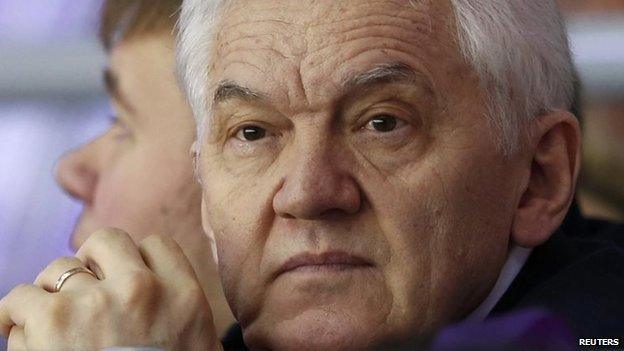
Estimated by Forbes, external to be worth $14.4bn (£11.4bn), he is a long-standing friend of President Putin and one of the main targets for US sanctions. A founder of Gunvor, one of the world's largest independent commodity trading companies involved in the oil and energy markets, he is also president of the SKA hockey club in St Petersburg. The US Treasury said Mr Putin had investments in Gunvor and may have access to company funds, an allegation rejected by the company.
Several companies linked to Mr Timchenko are included in the US sanctions
Novatek, Russia's second biggest gas producer, in which Mr Timchenko owns a 23.5% stake. The sanctions could hit the company's attempts to build a liquid natural gas plant, which depend on raising foreign investment
Volga Group, an investment strategy company owned by Mr Timchenko, with stakes in energy and infrastructure
Stroytransgaz Group, a construction holding company that he controls.
Arkady Rotenberg and Boris Rotenberg (EU and US sanctions)
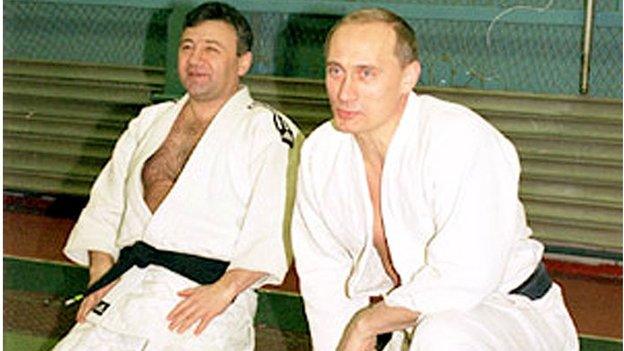
Arkady Rotenberg (left) with Vladimir Putin practising judo
Arkady Rotenberg (pictured left, with President Putin) has long-standing ties to Mr Putin personally. They were members of the same St Petersburg judo club when younger. Younger brother Boris has interests in ice hockey, together with Gennady Timchenko. The US Treasury says the Rotenberg brothers have provided "support to Putin's pet projects" by receiving and executing approximately $7bn of contracts for the Sochi Olympic Games and state-controlled energy giant Gazprom, through which their personal wealth has increased by $2.5bn. The brothers own SMP bank, which was hit hard by US sanctions in March.
The EU has blacklisted Arkady but not his brother Boris.
Igor Sechin (US sanctions)
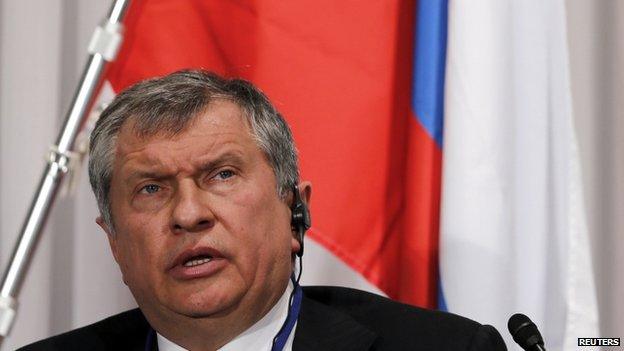
The head of Russia's leading integrated oil and gas company Rosneft has shown utter loyalty to Mr Putin, according to US officials. He served as the presidential deputy chief of staff until 2008 - when Dmitry Medvedev temporarily succeeded Mr Putin. Mr Sechin is seen as a powerful figure operating largely behind the scenes. He is also believed to share "economic interests" with Mr Putin.
Rosneft itself was added to the US sanctions list in July and the EU list in September, with limits placed on its access to capital markets. It is one-fifth owned by British oil giant BP. Failure to attract foreign financing could affect the company's oil-field development plans in Siberia, analysts believe.
EU sanctions introduced in September also target two other major state-owned oil companies - Transneft and Gazprom Neft, which is the oil unit of state gas monopoly Gazprom. The US list includes Lukoil, Gazprom and Surgutneftegaz.
Both the EU and US have banned the export of services and technology for Russian state oil companies engaged in deep-water and Arctic exploration.
Sergei Chemezov (EU and US sanctions)
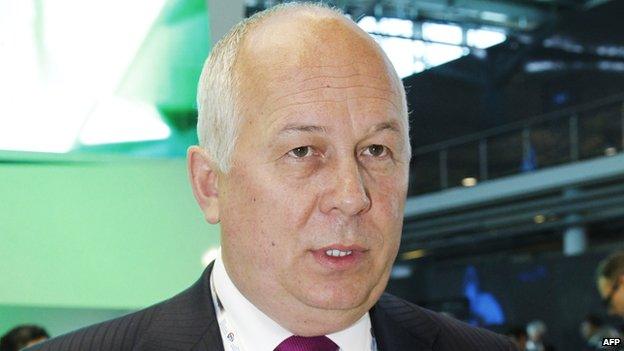
The director of the Rostec high-technology state corporation, Mr Chemezov has known Mr Putin since the 1980s when they lived in the same apartment complex in East Germany. They were Soviet KGB officers at the time. For years, Mr Chemezov headed the powerful state company dealing with arms exports - Rosoboronexport.
The EU describes Rostec as the leading Russian state-controlled defence and industrial corporation. A Rostec subsidiary, Technopromexport, is planning to build energy plants in Crimea, "thereby consolidating the illegal annexation" of the Ukrainian peninsula by Russia, the EU says.
In the US now Rostec is barred from getting loans with a maturity longer than 30 days.
Vyacheslav Volodin (EU and US sanctions)
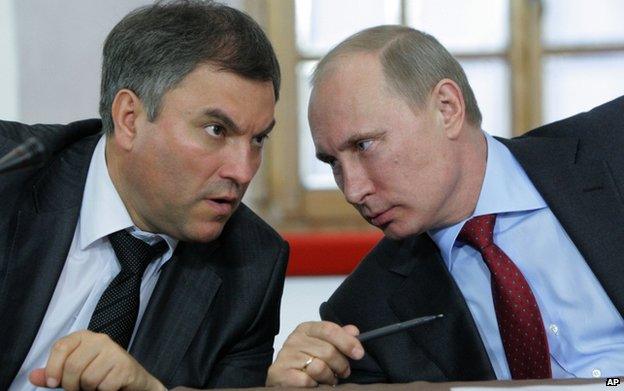
First deputy chief of the Kremlin staff since late 2011, Vyacheslav Volodin is one of President Putin's closest advisers. He is thought to have played a key role first in Russia's decision to move into Crimea, before overseeing the annexed Ukrainian region's political integration as part of Russia.
Yuri Kovalchuk (EU and US sanctions)
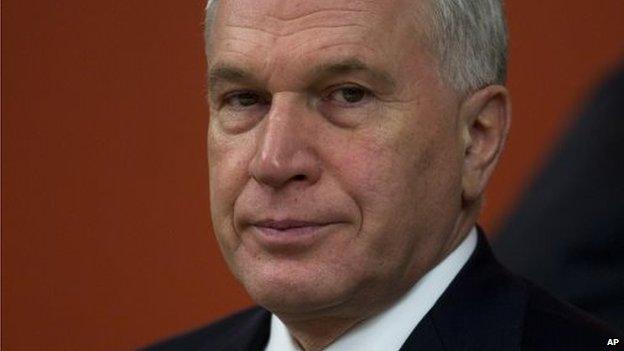
The largest single shareholder of Bank Rossiya (with about 38%), Mr Kovalchuk is one of Russia's 100 richest men. He is also the personal banker for senior officials of the Russian Federation, including Mr Putin, according to the US Treasury. He is a close adviser to the president and has been referred to as one of his "cashiers".
Nikolai Shamalov (EU and US sanctions)
He is the second largest shareholder in Bank Rossiya (with about 10%). Like Mr Kovalchuk, he is a long-time acquaintance of Mr Putin, the EU says.
Bank Rossiya (EU and US sanctions)
The 17th largest bank in Russia, with assets of approximately $10bn. The US Treasury and EU Official Journal describe it as "the personal bank" for senior Russian officials. Its shareholders include members of the inner circle associated with the mysterious Ozero Dacha Co-operative, a housing community on the shore of Lake Komsomolsk founded in 1996, whose original eight members have become extraordinarily rich under Mr Putin's rule. Many of these members are on the sanctions list.

Other major companies (EU and US sanctions)
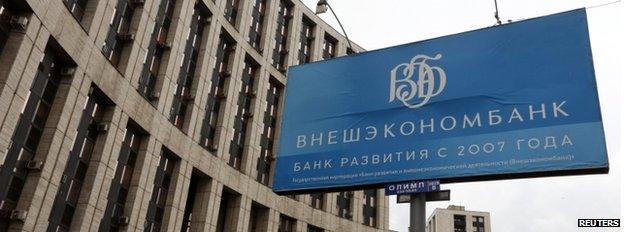
Vnesheconombank (VEB) and Gazprombank
EU and US citizens are barred from providing financing to these two major state-controlled banks, limiting their access to capital markets.
VEB - Russia's state economic development bank - is responsible for providing investment and support for projects at home and abroad, to "boost the competitive edge of Russia's economy, external". Gazprombank is the financial arm of state-run gas giant Gazprom but, along with VEB, is one of Russia's biggest lenders. Inclusion on the sanctions list could hamper its attempt to refinance a $1.2bn loan later this year.
Sberbank
Russia's biggest bank in terms of assets was added to the US sanctions list in September. It means Sberbank can only get short-term loans in the US.
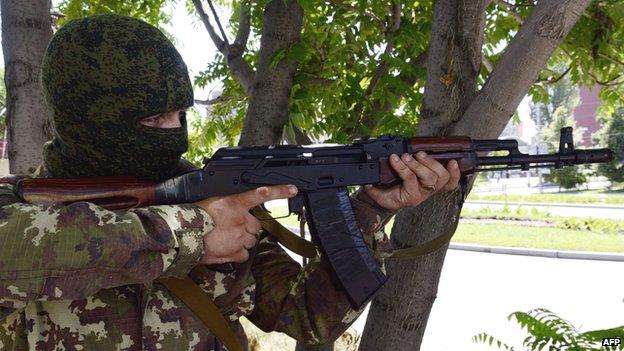
Kalashnikov Concern
One of 13 defence firms whose assets have been blocked by US sanctions, Kalashnikov Concern is targeted for its production of military weapons including assault rifles, grenade launchers and aircraft cannons.
The EU added Kalashnikov to its sanctions list in September, preventing it from getting dual-use technology - that is, technology that can have military applications. The same EU ban applies to eight other Russian defence firms, including Almaz-Antey (below).
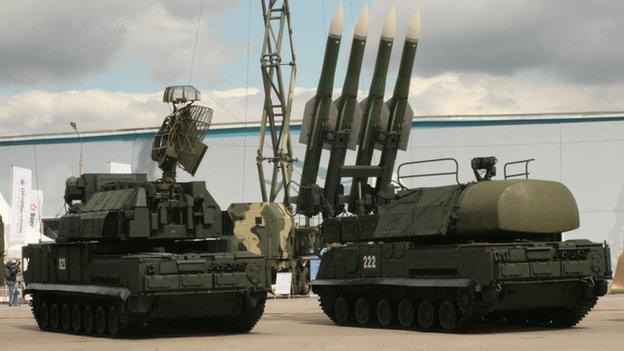
Almaz-Antey
This state-owned defence firm went on the EU sanctions list on 30 July and on the US list on 12 September.
It makes anti-aircraft weaponry including surface-to-air missiles. Western intelligence experts say such weapons have been supplied to the pro-Russian separatists in eastern Ukraine. Almaz-Antey makes the "Buk" missile system, blamed for the MH17 air disaster on 17 July. Russia and the separatists deny involvement, instead blaming the Ukrainian military.
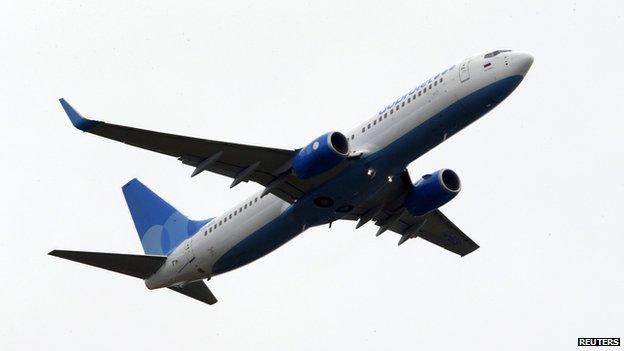
Dobrolet
This budget airline - a spin-off from Aeroflot - is now under EU sanctions. It was operating between Moscow and Crimea, but after being hit by sanctions it stopped flying. The sanctions hit its aircraft leasing arrangements.

Government officials
Sergei Ivanov (US sanctions)
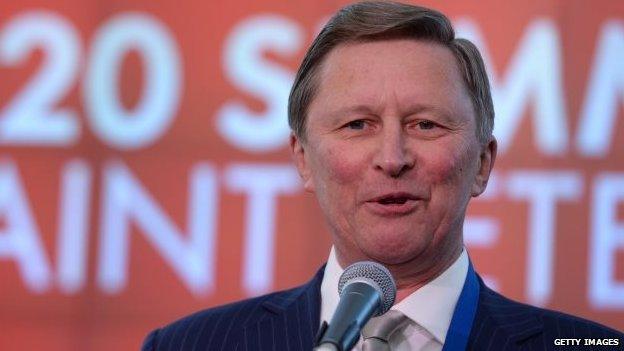
Believed to be a close personal friend of Mr Putin, he has been chief of staff of the Presidential Executive Office since 2011. The two men are the same age, come from St Petersburg and worked in intelligence before entering politics. In the late 1990s, when Mr Putin was director of the Federal Security Service (FSB), Mr Ivanov served as his deputy. Mr Ivanov was defence minister from 2001 to 2007, and then became first deputy prime minister and secretary of the Security Council.
Vladimir Yakunin (US sanctions)
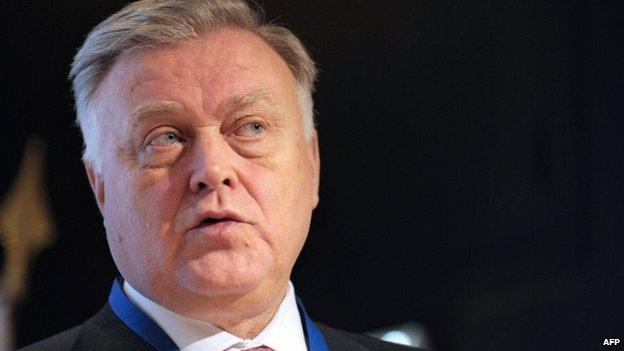
A friend of Mr Putin's for many years, he was a member of the president's long-standing St Petersburg network from the 1990s and a member of the Dacha Co-operative (see Bank Rossiya). He was appointed chairman of Russian Railways in 2005. Mr Yakunin regularly consults with Mr Putin on issues regarding the state-owned company and accompanies him on many domestic and international visits, according to the US Treasury. He was also in charge of major construction projects for the Sochi Winter Olympics.
Vladimir Kozhin (US sanctions)
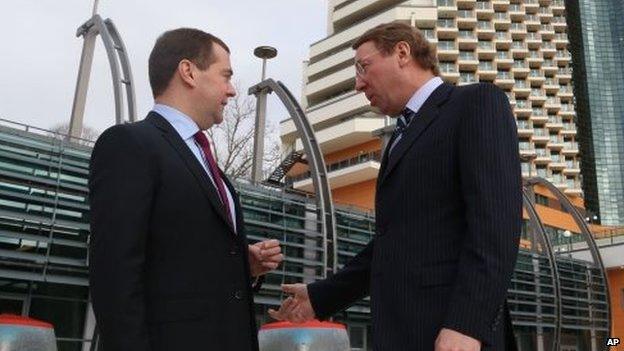
Vladimir Kozhin (R) with Prime Minister Dmitry Medvedev
As head of administration under President Putin since 2000, Mr Kozhin is responsible for overseeing a staff of 60,000; more than 100 state enterprises and institutions, including the Kremlin and other government buildings; and some 4,000 vehicles.
Viktor Ivanov (US sanctions)
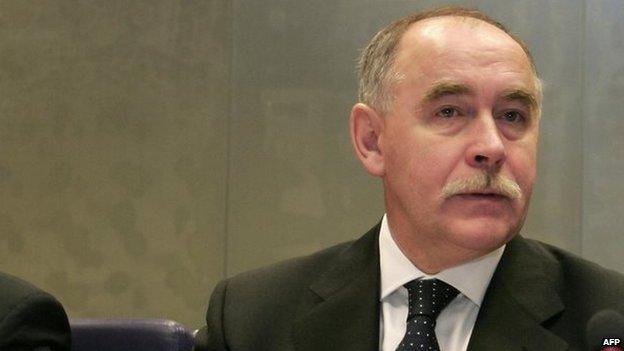
The former KGB officer and deputy director of the FSB is a close ally of Mr Putin who served as his chief of staff at the St Petersburg Mayor's Office. Mr Ivanov is currently the director of the Federal Drug Control Service and a member of the Security Council of the Russian Federation. He also served as deputy chief of the Administration of the Russian Federation from 2000 to 2004, and assistant to the president from 2004 to 2008.
Sergei Naryshkin (US and EU sanctions)
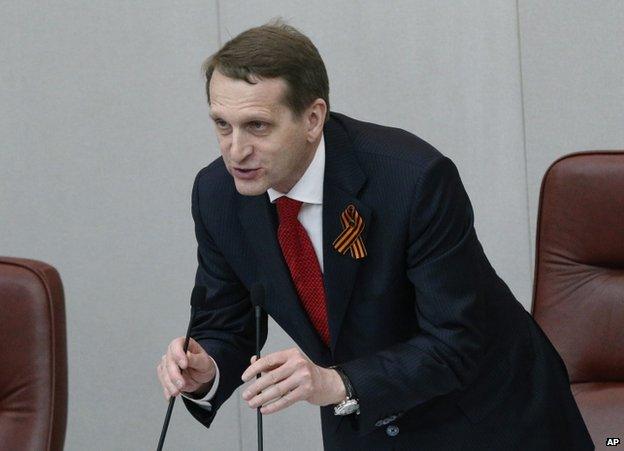
The speaker of the lower house of parliament, the State Duma. Russian media and foreign analysts say that, like Vladimir Putin, he once served in the Soviet KGB, although he has never confirmed this.
In September the EU added 11 more prominent Duma members to the sanctions list, including the veteran ultra-nationalist MP Vladimir Zhirinovsky.
Vladislav Surkov (US and EU sanctions)
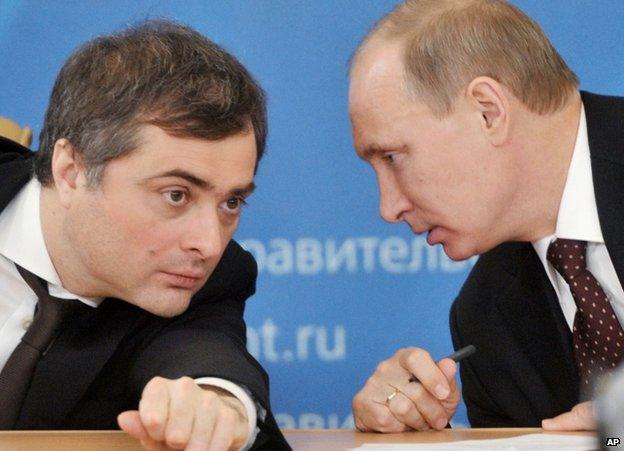
Currently a presidential aide, he is regarded as the mastermind of Mr Putin's successive election victories through his controversial strategy of "managed democracy". He became known as the "grey cardinal" for his behind-the-scenes influence particularly in Mr Putin's first presidential term of office from 2000-2008.
Dmitry Rogozin (US and EU sanctions)
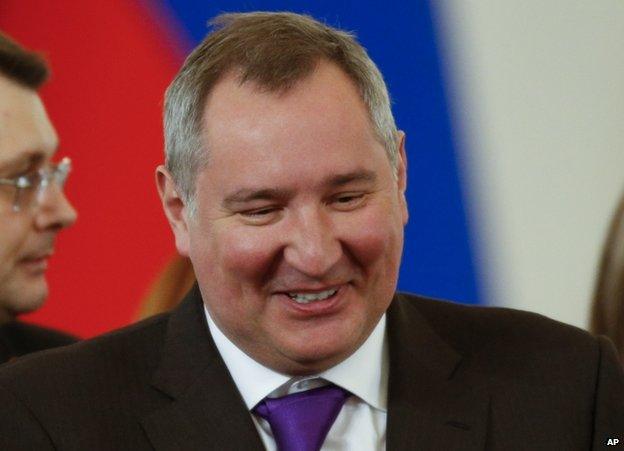
An outspoken deputy prime minister and former Russian ambassador to Nato in Brussels. He shrugged off the sanctions with a tweet that said: "All these sanctions aren't worth a grain of sand of the Crimean land that returned to Russia."
Mikhail Fradkov (EU sanctions)
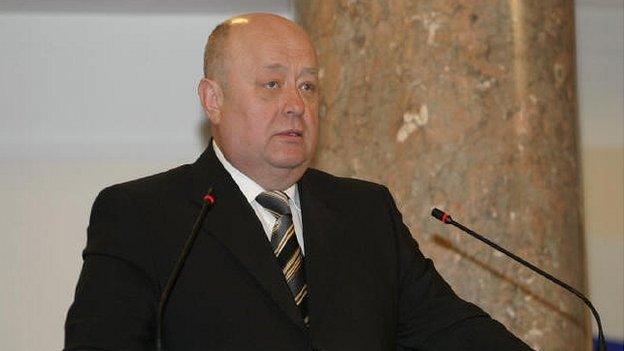
Director of Russia's Foreign Intelligence Service. As a member of Russia's powerful Security Council he also helped shape policy towards Ukraine, the EU says.
Alexander Bortnikov (EU sanctions)
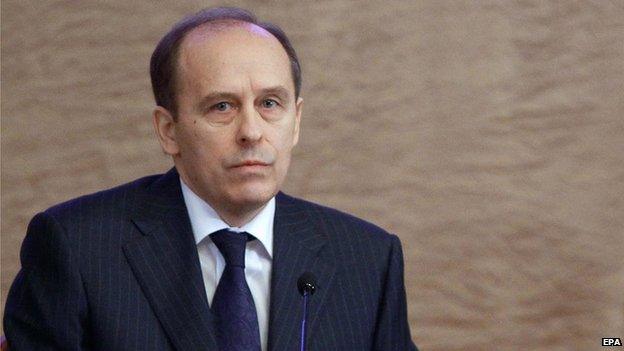
Director of the Federal Security Service (FSB), in charge of Russia's internal security. Blacklisted by the EU, like other security chiefs, because of his role in the Security Council.
Nikolai Patrushev (EU sanctions)
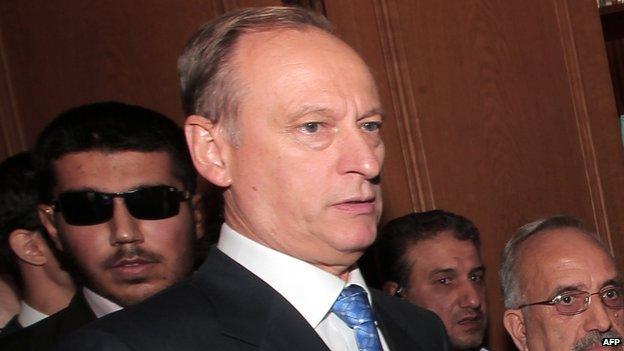
Secretary of the Security Council. A long-time associate of Vladimir Putin, he used to be director of the FSB, and took over that post from Mr Putin in 1999. Like Mr Putin, he also hails from St Petersburg.
Ramzan Kadyrov (EU sanctions)
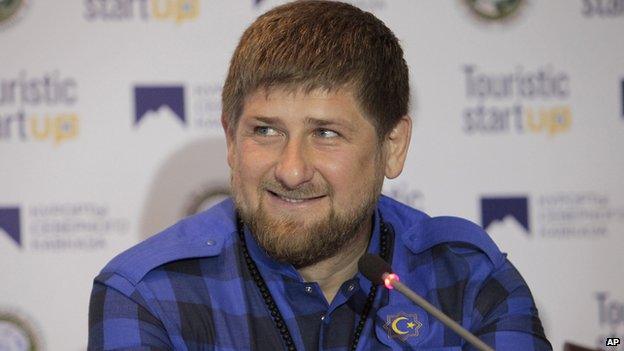
The Russian-backed President of Chechnya has voiced strong support for the rebels and for Russia's annexation of Crimea. Chechen volunteers have been seen with the rebels in eastern Ukraine, though it is not clear if Mr Kadyrov sent them there. Human rights groups say his militia in Chechnya has committed serious abuses, including kidnapping and torture.
Sergei Glazyev (US and EU sanctions)
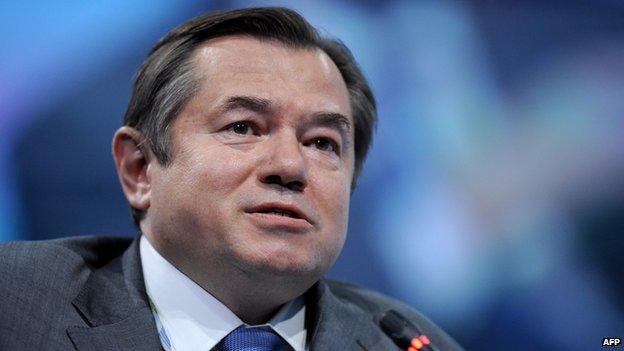
Widely regarded as Mr Putin's chief adviser on Ukraine, he talked openly of intervening militarily a month before Russian troops moved into Crimea.
Sergei Mironov (US sanctions)
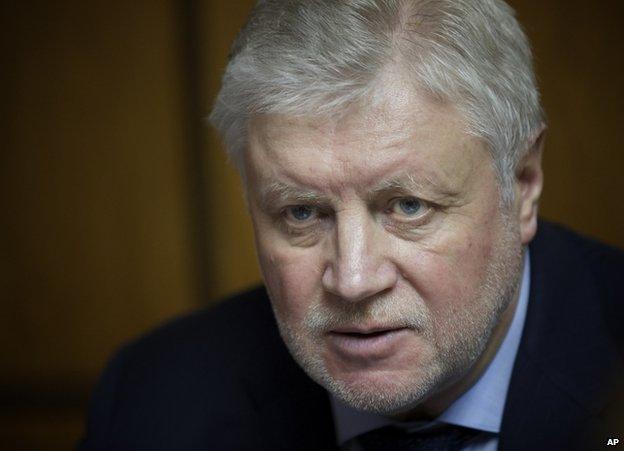
A leading MP, he has played a key role in the Crimea crisis.
Dmitry Kozak (US sanctions)
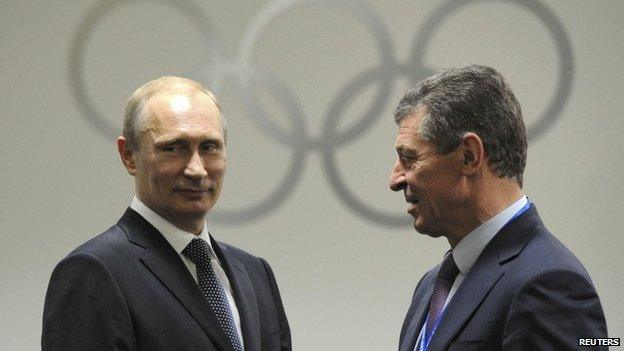
Has served as deputy prime minister since 2008, and is seen as a long-time ally of Mr Putin's. They worked together in St Petersburg's city administration in the 1990s, and Mr Kozak later followed his boss to Moscow. In 2004, he headed Mr Putin's election campaign. He also served as the presidential representative in the volatile North Caucasus region - a sign of personal trust by Mr Putin.

Pro-Russia separatist leaders
Alexander Zakharchenko (EU sanctions)
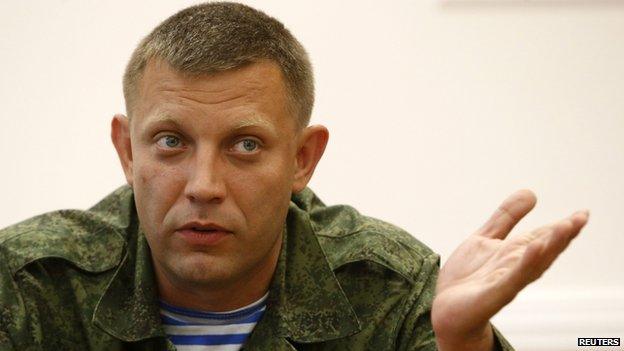
A local field commander, Mr Zakharchenko became the "prime minister" of the self-styled "Donetsk People's Republic" (DPR) in early August.
On 28 August Mr Zakharchenko admitted that thousands of Russian citizens, including many professional soldiers, were fighting alongside the separatists. , external
He is among more than a dozen rebel leaders in Donetsk, Luhansk and Crimea targeted by EU and US sanctions. Not all of them are ethnic Russians. But Russian nationals are prominent in the separatist leadership.

Public figures
Dmitry Kiselyov (EU sanctions)
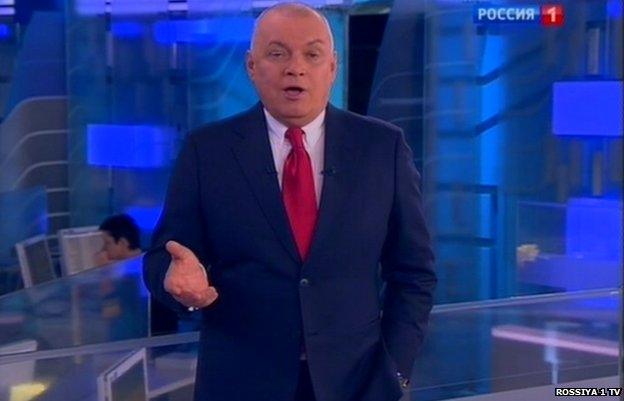
Russian TV anchor Dmitry Kiselyov is known for his anti-Western outbursts
A controversial state TV anchor who recently became head of the state news agency Russia Today. He is well-known for his anti-Western and homophobic diatribes, as well as his extremely hostile attitude to the protests in Kiev that led to the ousting of President Viktor Yanukovych.